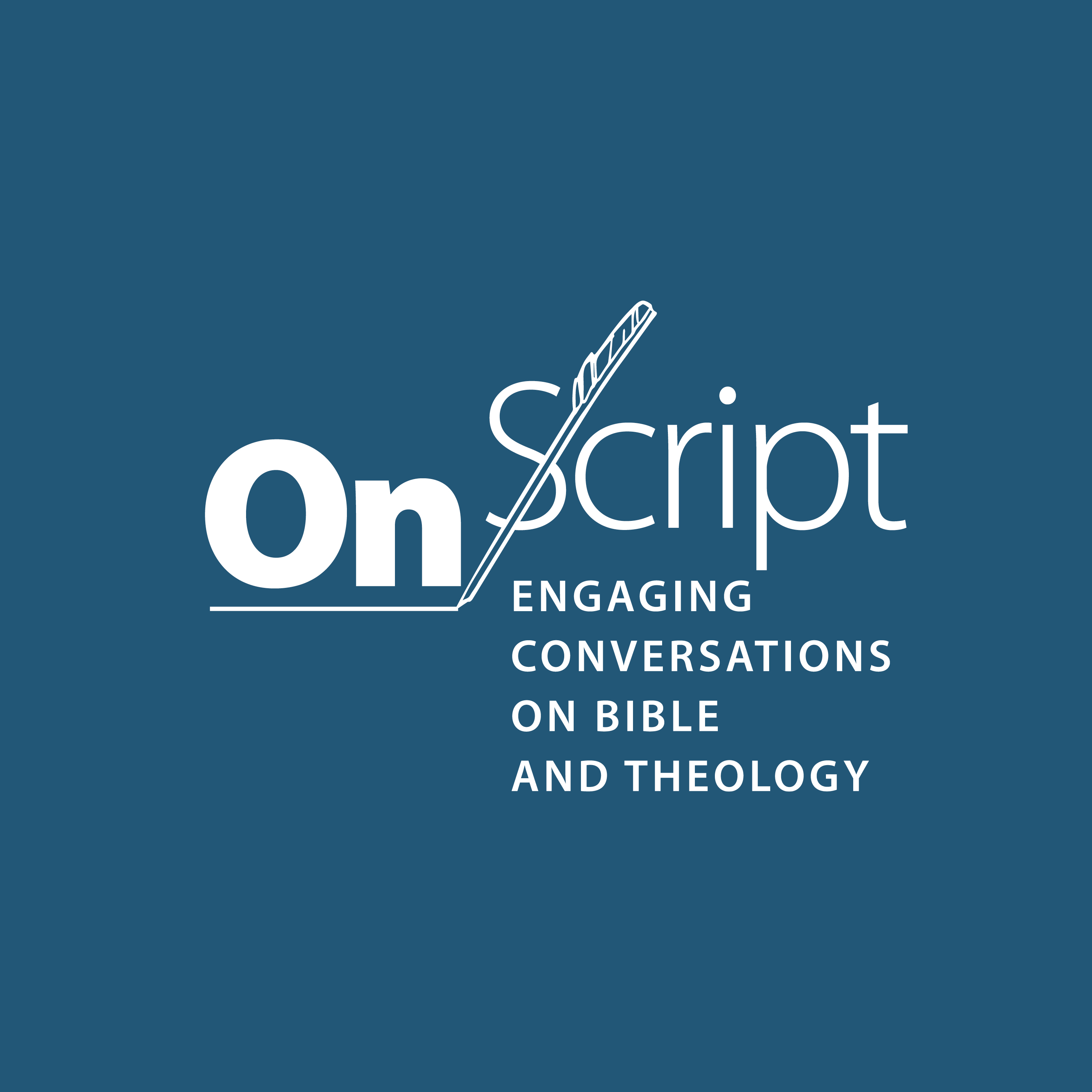Episodes

Monday Dec 03, 2018
Lucy Peppiatt - Gender and Hermeneutics in Paul (Pt 2)
Monday Dec 03, 2018
Monday Dec 03, 2018
Episode: This episode covers Paul, gender, hermeneutics, theology, and all the things. Lucy Peppiatt helps us think through the challenging issues at play in 1 Corinthians 11, territory we covered last week with Michael Lakey, but this time from a different angle. Lucy has thought long and hard about this passage, and talks with Matt L. about some of her groundbreaking work.
Guest: Lucy Peppiatt is Principal of Westminster Theological Centre, where she also lectures in Systematic Theology. She's the author of Unveiling Paul’s Women: Making Sense of 1 Corinthians 11:2-16 (Wipf and Stock, 2018),
Women and Worship at Corinth: Paul’s Rhetorical Arguments in 1 Corinthians (Wipf and Stock, 2015), and The Disciple: On Becoming Truly Human (Wipf and Stock, 2012). She has a forthcoming book on women in scripture with IVP Academic. Lucy co-leads Crossnet Church in Bristol with her husband Nick.

Help Support OnScript: Click through one of the links above to purchase one of Lucy's books (or others, while you're in there), and OnScript gets a whopping 2% or so (at no loss to you). Each bit helps us keep this operation going. Or visit our Donate Page if you want to join the big leagues and become a regular donor. Don't let us stop you from doing both.

Monday Nov 26, 2018
Gender & Hermeneutics in Paul (Pt 1) - Michael Lakey
Monday Nov 26, 2018
Monday Nov 26, 2018
Episode: This is the first of a two part episode on gender and hermeneutics in the letters of Paul. Our focus text is 1 Cor 11, a text that poses several interpretive and theological challenges that cannot be easily resolved. Michael Lakey talks with Matt L about his book Image and Glory: 1 Corinthians 11:2-16 as a Case Study in Bible, Gender and Hermeneutics (T&T Clark, 2010). They discuss gender, cosmology, hermeneutics, Paul, the church, and everything in between. Next week we'll here a different take on the same issue.
Guest: Michael is Lecturer in New Testament at Ripon College, Cuddesdon. He divides his time between teaching NT at Cuddesdon and being a parish priest of three parishes in South Oxfordshire. He teaches across the NT curriculum. His ongoing research interests include St Paul, sex and gender in Antiquity, and the hermeneutical relationship between Scripture, doctrine, and liturgy. Michael is author of three books, his thesis monograph on gender and cosmology in 1 Corinthians, entitled Image and Glory of God (T. & T. Clark, 2010), an edited volume on being a priest and an academic, entitled Academic Vocation in the Church and Academy Today (Ashgate/Routledge, 2016) and a new book on baptism and the Lord’s Supper in the writings of Paul, entitled The Ritual World of Paul the Apostle(Bloomsbury, 2018). He is a regular book reviewer for Modern Believing and Journal for the Study of the New Testament. (from his faculty website)
Help Support OnScript: Click through one of the links above to purchase one of the books (or others, while you're in there), and the OnScript Podcast gets a whopping 2.5% or so (at no loss to you). Each bit helps us keep this operation going. Or visit our Donate Page if you want to join the big leagues and become a regular donor. Don't let us stop you from doing both.

Monday Nov 12, 2018
Beverly Gaventa - Reflections on Pauline Scholarship and Teaching
Monday Nov 12, 2018
Monday Nov 12, 2018
Episode: In this episode, Erin interviews Beverly Roberts Gaventa on Pauline theology, her thoughts on pedagogy, and on why Matt Bates is wrong about Karl Barth.
Guest: Beverly Roberts Gaventa is Distinguished Professor of New Testament at Baylor University. She previously taught at Princeton Theological Seminary, Columbia Seminary, and Colgate Rochester Divinity School. Her specializations include theological and historical interpretation of the letters of Paul, and the letter of Romans in particular. She was the president of the Society of Biblical Literature in 2016, and she has received numerous awards and honorary degrees for her exceptional teaching and research. She is the author of numerous books, including When in Romans, Our Mother Saint Paul, andApocalyptic Paul: Cosmos and Anthropos in Romans 5-8.
Help Support OnScript: Click through one of the links above to purchase one of the books (or others, while you're in there), and the OnScript Podcast gets a whopping 2.5% or so (at no loss to you). Each bit helps us keep this operation going. Or visit our Donate Page if you want to join the big leagues and become a regular donor. Don't let us stop you from doing both.

Tuesday Oct 30, 2018
Christopher Seitz - The Elder Testament
Tuesday Oct 30, 2018
Tuesday Oct 30, 2018
Episode: Canon, theology, and Trinity are brought together in this episode featuring guest Chris Seitz. But here's the surprise: We are talking about Trinity in the Old Testament. Seitz has written an outstanding book, The Elder Testament, showing how the Old Testament's literal sense pressures us in a trinitarian direction. Along the way Seitz drops funny personal stories about noted biblical scholars Brevard Childs and Leander Keck. Hosted by Matt Bates and Matt Lynch.
Guest: Christopher Seitz is Senior Research Professor at Wycliffe College in the University of Toronto, a position he has held since 2007. Previously he was Professor of Old Testament at Yale University and the University of St Andrews. He is an ordained Episcopal priest. Some of his books include The Bible as Christian Scripture (SBL), The Character of Christian Scripture (Baker Academic), and theological commentaries on Joel and Colossians. The list could go on.
The Book: Christopher R. Seitz, The Elder Testament: Canon, Theology, Trinity (Baylor University Press, 2018). Canon to Theology to Trinity. This trilogy, as Seitz concludes, is not strictly a historical sequence. Rather, this trilogy is ontologically calibrated through time by the One God who is the selfsame subject matter of both the Elder and New Testaments. The canon makes the traditional theological work of the church possible without forcing a choice between a minimalist criticism or a detached, often moribund systematic theology. The canon achieves "the concord and harmony of the law and the prophets in the covenant delivered at the coming of the Lord" of which Clement of Alexandria so eloquently spoke.
Endorsement: Impossible. Sealed tight. The Christian doctrine of the Trinity cannot be successfully grounded in the Old Testament, read on its own terms. Or so scholars have claimed for hundreds of years. But the Old Testament’s witness to God’s complex reality contains volcanic pressure. Large cracks have already appeared. Christopher Seitz has blown off the lid. – Matthew W. Bates, author of The Birth of the Trinity
(Book description and endorsement from the publisher's website, abridged)
Help Support OnScript: Click through one of the links above to purchase one of the books (or others, while you're in there), and the OnScript Podcast gets a whopping 2.5% or so (at no loss to you). Each bit helps us keep this operation going. Or visit our Donate Page if you want to join the big leagues and become a regular donor. Don't let us stop you from doing both.

Monday Oct 15, 2018
OnScript Q&A - October 2018
Monday Oct 15, 2018
Monday Oct 15, 2018
Episode: Matt, Matt, Erin, & Dru discuss your questions. And YOU WON'T BELIEVE WHAT THEY SAY NEXT! Listen to find out.
Help Support OnScript: Visit our Donate Page if you want to join the big leagues and become a regular donor.

Monday Oct 01, 2018
Joshua Berman - Inconsistency in the Torah
Monday Oct 01, 2018
Monday Oct 01, 2018
Episode: Dru and Joshua Berman discuss his bold claims in his book—Inconsistency in the Torah—that suggest source-criticism might erroneously ignore cognate literary forms in the ancient Near East, favoring notoriously slippery histories behind each source in the Torah instead. Working through Egyptian and Mesopotamian parallels, Berman discusses how the old paradigm of sources might be insufficient in the face of other comparable literatures. We talk through the book's core arguments, krav maga, Judaism in Israel, Fijian vacations with Seventh Day Adventists, and more!
Guest: Dr. Joshua Berman is an associate professor at Bar-Ilan University. His books include Created Equal: How the Bible Broke With Ancient Political Thought and The Temple (OUP) and Inconsistency in the Torah: Ancient Literary Convention and the Limits of Source Criticism (OUP). Dr. Berman is an ordained Orthodox rabbi with a B.A. in Religion from Princeton University and a Ph.D. in Bible from Bar-Ilan University in Israel.
The Book (Inconsistency in the Torah, from the publisher): "This book proposes a new approach to the Pentateuch’s narrative and legal inconsistencies that scholars have taken as signs of fragmentation and competing agendas. ... The recent pivot to empirical models constitutes a major challenge to traditional historical-critical method, mandating a review of its premises. The book includes a critical intellectual history of the theories of textual growth in biblical studies tracing how critics were influenced first by the fascination with science in the eighteenth century and then by Romanticism and Historicism in the nineteenth. These movements unwittingly led the field to adopt a range of commitments and interests that impede the proper execution of historical critical method in the study of the Pentateuch. It concludes by advocating a return to the hermeneutics of Spinoza and adopting a methodologically modest agenda."
Help Support OnScript: Click through one of the links above to purchase one of Berman's book (or others, while you're in there), and the OnScript Podcast gets a whopping 2% or so (at no loss to you). Each bit helps us keep this operation going. Or visit our Donate Page if you want to join the big leagues and become a regular donor. Don't let us stop you from doing both.

Monday Sep 17, 2018
Doug Groothuis - Walking through Twilight
Monday Sep 17, 2018
Monday Sep 17, 2018
Episode: Erin and Dru host Douglas Groothuis for an episode that breaks from our typical Onscript fare. Doug's newest book, Walking through Twilight is a memoir about his journey alongside his wife as she was diagnosed, and then finally succumbed to a form of dementia called Primary Progressive Aphasia. Doug's book is raw and painful to read at times, but it is also profound and sure to be helpful for those walking similar roads, pastoring such families, or offering help.
Guest: Douglas Groothuis is Professor of Philosophy and the head of the Apologetics and Ethics program at Denver Seminary. He received a PhD and a BS from the University of Oregon, and an MA in philosophy from the University of Wisconsin–Madison. He is the author of numerous books, including Christian Apologetics: A Comprehensive Case for Christian Faith, which was awarded the Award of Merit in the Apologetics/ Evangelism category from Christianity Today in 2012 and answers the troubling questions that people are actually asking.
The Book: Douglas Groothuis, Walking through Twilight: A Wife's Illness – A Philosopher's Lament (IVP, 2017). (from the publisher's website) Nothing is simple for a person suffering from dementia, and for those they love. When ordinary tasks of communication, such as using a phone, become complex, then difficult, and then impossible, isolation becomes inevitable. Helping becomes excruciating.
In these pages philosopher Douglas Groothuis offers a window into his experience of caring for his wife as a rare form of dementia ravages her once-brilliant mind and eliminates her once-stellar verbal acuity. Mixing personal narrative with spiritual insight, he captures moments of lament as well as philosophical and theological reflection. Brief interludes provide poignant pictures of life inside the Groothuis household, and we meet a parade of caregivers, including a very skilled companion dog.
Losses for both Doug and Becky come daily, and his questions for God multiply as he navigates the descending darkness. Here is a frank exploration of how one continues to find God in the twilight.
Help Support OnScript: Click through one of the links above to purchase Doug's book (or others, while you're in there), and the OnScript Podcast gets a whopping 2.5% or so (at no loss to you). Each bit helps us keep this operation going. Or visit our Donate Page if you want to join the big leagues and become a regular donor. Don't let us stop you from doing both.

Monday Sep 03, 2018
Tim Mackie and Jon Collins - The Bible Project
Monday Sep 03, 2018
Monday Sep 03, 2018
Episode: Tim Mackie and Jon Collins chat with Matt L. and Dru J. about how the Bible Project started, their thesis that the Bible is a unified story, P967, and a wide range of other topics you've been dying to learn about.
The Bible Project: If you aren't familiar with The Bible Project, it's best to visit their site (https://thebibleproject.com/), but briefly, and from their website, 'The Bible Project is a non-profit animation studio that produces short-form, fully animated videos to make the biblical story accessible to everyone, everywhere.' They're a youtube channel that makes super helpful 5 min (or so) videos to explain the books of the Bible and its major themes.
Tim & Jon: Find out about Tim and Jon HERE.

Monday Aug 20, 2018
Scot McKnight - Colossians and Philemon
Monday Aug 20, 2018
Monday Aug 20, 2018
Episode: Scot McKnight is back, bringing a cosmic Christological vision and wisdom about how the church should handle the topics of slavery and racial reconciliation. Last time he and Dennis Venema were talking Adam and the Genome. This time Scot shares what he learned while penning two exciting new commentaries, The Letter to Philemon and The Letter to the Colossians, for the beloved NICNT series. You also get to hear him sing. Maybe. Hosted by Matthew W. Bates.
Guest: Scot McKnight is Julius R. Mantey Professor of New Testament at Northern Seminary. He has written more than fifty books and blogs regularly at Jesus Creed. Scot is a much-sought-after conference speaker and a renowned expert on early Christianity. He has written both academic and popular titles, including The Jesus Creed (Christianity Today’s book of the year in 2004); The Blue Parakeet; The King Jesus Gospel, and most recently Open to the Spirit. The most important thing he has written though is the foreword for Salvation by Allegiance Alone--at least that is how most people see it. Like my mother and I.
The Books: Scot McKnight, The Letter to the Colossians (New International Commentary on the New Testament; Grand Rapids: Eerdmans, 2018). The Letter to the Colossians offers a compelling vision of the Christian life; its claims transcend religion and bring politics, culture, spirituality, power, ethnicity, and more into play. Delving deeply into the message of Colossians, this exegetical and theological commentary by Scot McKnight will be welcomed by preachers, teachers, and students everywhere.
Scot McKnight, The Letter to Philemon ( New International Commentary on the New Testament; Grand Rapids: Eerdmans, 2017). Paul's letter to Philemon carries a strong message of breaking down social barriers and establishing new realities of conduct and fellowship. It is also a disturbing text that has been used to justify slavery. Though brief, Philemon requires close scrutiny. In this commentary Scot McKnight offers careful textual analysis of Philemon and brings the practice of modern slavery into conversation with the ancient text. Too often, McKnight says, studies of this short letter gloss over the issue of slavery—an issue that must be recognized and dealt with if Christians are to read Philemon faithfully. Pastors and scholars will find in this volume the insight they need to preach and teach this controversial book in meaningful new ways. (Descriptions from the publisher's website)
The OnScript Quip (our review): Discover how Paul's cosmic vision for holistic reconciliation begins with Jesus the king's work in the household. Fresh, up to date, independent. Some commentaries are stale rehashes that have already expired before printing. Not McKnight's on Colossians and Philemon. Pastors and scholars are guaranteed to benefit from McKnight's scholarly expertise and heart for the the church for many years to come. -- Matthew W. Bates, Quincy University, OnScript

Tuesday Aug 07, 2018
Stephen Chester - Reading Paul with the Reformers
Tuesday Aug 07, 2018
Tuesday Aug 07, 2018
Episode: Live from Nashotah House Theological Seminary in Wisconsin! OnScript host Matt Lynch interviews Stephen Chester. We talk about how Luther & Calvin have taken a whipping by some proponents of the New Perspective on Paul, and how they, and we, need to give them a second look. To that end, we discuss his book Reading Paul with the Reformers, winner of Christianity Today's 2018 Book of the Year in Biblical Studies.
Guest: Stephen Chester is Professor of NT at North Park Theological Seminary in Chicago. Stephen is ordained in the PCS (Presbyterian denomination of the Church of Scotland) and is the author of Reading Paul with the Reformers: Reconciling Old and New Perspectives (Eerdmans, 2017) and Conversion at Corinth: Perspectives on Conversion in Paul's Theology and the Corinthian Church (Bloomsbury, 2005).
Help Support OnScript: Click through one of the links above to purchase Stephen Chester's book (or others, while you're in there), and the OnScript Podcast gets a whopping 2.5% or so (at no loss to you). Each bit helps us keep this operation going. Or visit our Donate Page if you want to join the big leagues and become a regular donor. Don't let us stop you from doing both.

